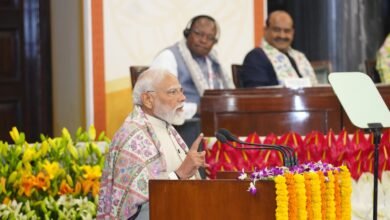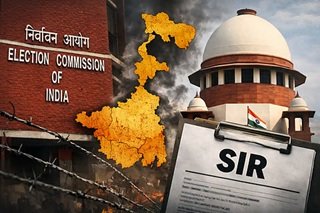Significance of Sri Aurobindo’s 150th Birth Anniversary

Harivansh Narayan Singh
Deputy Chairman, Rajya Sabha
Namaskar,
I feel greatly honored and privileged to be here amidst you all today. I thank Sri Aurobindo Society who has given me the opportunity to reflect on one of the most remarkable man of India. Sri Aurobindo’s influence on the national political and cultural scene was tremendous not only in his times but also after his death. C.R.Das, the noted freedom fighter, once rightly prophesied “…long after he is dead and gone, he will be looked upon as the poet of patriotism, as the prophet of nationalism and the lover of humanity. Long after he is dead and gone, his words will be echoed and reechoed not only in India, but across distant seas and lands.” Today we all know how true his words were as Sri Aurobindo’s thoughts continue to inspire and touch the lives of millions even now. He was a towering personality who is considered a national as well as a global icon.
Aurobindo’s nationalism/ Against dominion status
There is no doubt that there were many great leaders on the Indian political horizon in the early 20th century, yet Sri Aurobindo’s exceptional intellect and fiery spirit made him stand out. His passionate and militant patriotism inspired many a youth in those times. His idea of complete freedom was a manifestation of his indomitable spirit. In this he stood apart many of the contemporary great leaders of his times. He believed that unless unqualified Swaraj was granted to the Indians, expansion of Legislative Councils and appointment of Indians to Executive Councils was meaningless. In fact, he was the first Indian political leader to use the word “Independence” instead of “Swaraj’. He was convinced that without political freedom, no real socio-economic and administrative reform was possible in India. To quote him, “Political freedom is the life-breath of a nation; to attempt social reform, educational reform, industrial expansion and moral improvement of the race without aiming first and foremost at political freedom is the very height of ignorance and futility“. It would not be an exaggeration if I say that the nature of freedom has not been explored more profoundly and passionately by anyone other than Sri Aurobindo.
To him, India was not just a piece of land, not merely a collection of people. It was a conscious Spiritual Being, a Divine Power, a Shakti, Devi and Goddess. India is Mother India, a living form of the Divine Mother. He said that India must be free from foreign control, only then she could develop and manifest the greatness of her soul.
Real purpose of independence:
I find Sri Aurobindo’s idea of political freedom quite intriguing and unique. He valued independence not in itself but as an opportunity for India to perform her mission. Sri Aurobindo strongly believed that India had a bigger role to play in Asia and the world. He did not want India to be like other nations with an opulent industry and commerce and immense military strength, practicing power politics successfully, dominating a large part of the world without her spiritual heritage.
Spiritual nationalism:
Equally fascinating was his idea of spiritual nationalism. For him “nationalism is not a mere political programme. It is a religion that has come from God; Nationalism is a creed which you shall have to live….if you are going to be nationalist, if you are going to assent to this religion of nationalism, you must do it in the religious spirit. You must remember that you are the instrument of God”. He elevated the demand for national freedom to a religious faith so that the masses could be awakened.
Passive resistance:
Sri Aurobindo advocated passive resistance as the only efficacious method to fight foreign rule. He proposed that there should be complete boycott of government schools, courts of law, administration and foreign goods. He proved himself one of those radical leaders of the early 20th century who wanted to involve the masses in the struggle. Awakening political consciousness of the masses was for him an essential condition of Swaraj. There is not an iota of doubt that his political thoughts made a strong mark amongst the masses especially the youth and in the few years of his active politics he changed the course of thinking of the entire country.
Not completely against violence:
Two great souls of Indian soil – Gandhiji and Aurobindo, are considered national and global icons. While Gandhiji expounded a non-violent approach and advocated a complete allegiance to ahimsa to fight political tyranny, Aurobindo did not turn non-violence into an unwavering, absolute doctrine. To him violence was undesirable but not prohibited. This in no way meant that he advocated non violent means of action. He opined that the choice of violent or non-violent means of resistance depended on expediency and nature of the oppression. He did not condemn violence as criminal or unjustifiable in all circumstance. He said “Liberty is the life-breath of nation; and when the life is attacked, when it is sought to suppress all chance of breathing by violent pressure, any and every means of self-preservation becomes right and justifiable”.
Thus, in the face of oppression, Passive Resistance could become aggressive resistance, including retaliation. He maintained that the end was the freedom of the nation and in the choice of means for the realization of this supreme end, ethical considerations were irrelevant. Unlike Gandhi who considered ahimsa as an ethical principle that was grounded in the selflessness, use of violence in furtherance of the Boycott was, according to Aurobindo, “purely a matter of policy and expediency….the moral question does not arise”. From the very beginning Sri Aurobindo objected to the label Extremist and described himself and other Extremists as Nationalists.
Undaunting:
Sri Aurobindo was courage personified. When many great leaders fighting against the British Raj were satisfied with dominion status, he had the courage to declare openly for complete and absolute independence. He wrote “there are some who fear to use the word ‘freedom’ but I have always used the word because it has been the Mantra of my life to aspire towards the freedom of my nation“. In his distinctive boldness he made fiery speeches right from his student days. He also did not hesitate in criticizing the British government or the policies of the Indian National Congress. It was because of bold speeches and writings that he earned the hostility of the British government and was described by Viceroy Lord Minto as the “most dangerous man in India”. In a series of articles he wrote against the weaknesses of method of gradual and steady reform adopted by Congress for liberation from British rule. His style of expression caused such a furore that Justice Ranade had to ask the magazine to modify its tone. We all agree that his view of the future of British imperialism and Indian nationalism was remarkably incisive and perceptive but it was much ahead of his time. His writings on Indian nationalism have an enduring value.
His views on the west:
Though he was a patriot and a staunch critic of the imperialist government Sri Aurobindo was not against everything western. Early on he distinguished between the Eastern and Western civilization saying that while India focuses on the spiritual and the eternal. However, in later years he admitted that “the west has had no less than the East its spiritual seeking ….while the East also has had its materialistic tendencies, its material splendors, its similar or identical dealings with life and matter and the world in which we live.” Romain Rolland, thus, rightly regarded him as the highest synthesis of the genius of the East and the West and the ‘Prince among the Indian thinkers’.
Not a blind acceptance of the past:
Although Sri Aurobindo was the ‘Messiah of Indian culture and civilization’ as Tagore rightly called him, he was not for a blind acceptance and revival of the past.All that was great in the past cannot be repeated, for he realized that there are new needs and other vistas before us. “Our sense of greatness of our past must not be made a fatally hypnotizing lure to inertia; it shall be rather an inspiration to renewed and greater achievement”, he said. He is not averse to taking from the West whatever fills our need and respond to Indian spirit provided we do not abandon , in the process our fundamental view of God, man and nature.
An unusual trajectory:
The twists and turn of Sri Aurobindo’s life is quite interesting. Despite his anglicized upbringing he was fiery patriot who got himself intentionally disqualified in the final round of ICS examination to serve his motherland.In just four years of militant political activity he had earned an unrivaled position as a political leader. You will not get any example of a leader who quit active politics to embrace spiritualism.
Philosopher:
Sri Aurobindo was undoubtedly one of the greatest philosopher of the 20th century. Sarvapalli Radhakrishnan described him as ‘the most accomplished of modern Indian thinkers’. Although Sri Aurobindo covers a lot of common ground with Vivekananda, Tilak and Gandhi, but his distinction lies in his impressive philosophical perspective coupled with a creative synthesis of the traditional ethos of Hinduism and modernity. I am in awe of the subjects Sri Aurobindo dealt with during his lifetime. The complete works of Sri Aurobindo brought by the Aurobindo Ashram in 36 volumes on The Life Divine, The Synthesis of Yoga, The Secret of the Vedas, The Human Cycle, The Ideal of Human Unity, The Renaissance of India, Future Poetry and the magnificent epic, Savitri, etc are a testimony in this regard.
His unique philosophy of Integral Yoga aims at the transformation of the entire being including Physical, Vital, Mental, Psychic, and Spiritual. The aim of this yoga is not an escape from life or a shunning of worldly existence, but a radical change in our life even while living amidst it.
Conclusion:
Besides his political philosophy it was his rustic simplicity that endeared Aurobindo to the masses. With his dhoti, piran and urani he looked enigmatic. It is a divine coincidence and nothing else that the birthday of India’s first evolutionary yogi coincides with India’s independence day i.e. 15th August.
I am very happy that this illustrious leader’s legacy is being cherished and carried forward in its true spirit by the Aurobindo Society, founded by none other than the Mother, who was not only a close associate of Sri Aurobindo but also a spiritual guru herself. Addressed as ‘Mother’ by Sri Aurobindo himself, she is credited to have shouldered the complete responsibilities of running the Aurobindo Ahsram since its establishment and instituting Sri Aurobindo International Center of Education, the international township – Auroville and the Aurobindo Society.
I am delighted to know that the Society which seeks to bring a dynamic spirituality into material life and all its activities, does not confine itself to spiritual lectures but also on action based programmes in the field integral education, palliative care, mental health, rural development, sustainable development, etc.
Today as we celebrate 150th birth anniversary of Sri Aurobindo and 75th year of India’s independence, it is an excellent opportunity to assess India’s situation not only in terms of GDP and economic growth but also in the deeper aspects of its inner capacities. I hope that Sri Aurobindo’s anniversary will be the occasion not only for an assessment and appreciation of what Sri Aurobindo himself stood for but for a deeper and wider spiritual introspection covering India and indeed the entire human race.
Friends, Sri Aurobindo believed that great and new creation has to come from the youth and they must be the builders of the new world. He said “It is the young who can build the new world — not those who accept the competitive individualism, the capitalism or materialistic communism of the west as India’s future nor who enslaved to old religions formulas and cannot believe in the acceptance and transformation of life by the spirit, but all who are free in the mind and heart to accept the completer truth and a greater ideal.”
As a country with the largest ever adolescent and youth population, I implore the youths of this country to draw inspiration from Sri Aurobindo and make India the spiritual hub of the world. Hon’ble Prime Minister, Shri Modi ji has also highlighted that the youth should also be encouraged towards the concept of greatness as embodied in the philosophy of Nar to Narayan to create a Maha Manavas propounded by Sri Aurobindo. He has also stated that Sri Aurobindo’s philosophy of Revolution and Evolution should be emphasized as part of the commemoration of the 150th birth anniversary of Sri Aurobindo.
It gives me immense pleasure to see that Sri Aurobindo Society has been making continuous efforts to inspire the youth of India and the world with the spiritual teachings of Sri Aurobindo. There can be no greater tribute to this ‘Prophet of Nationalism’ than an India which has dedicated itself to modernization without losing in the process the spiritual legacy of the pasts. I wish the Society all the best and once again thank you for giving me this opportunity to interact with you all.
Just like I began, I would like to conclude my address by quoting the words of C R Das mentioned on the commemorative plaque for Sri Aurobindo Memorial Court Room “he will be looked upon as the poet of patriotism, the prophet of nationalism and the lover of humanity. His words will be echoed and re-echoed not only in India but across the distant seas and lands”.
My best wishes to all of you.
Thank You. Jai Hind!






